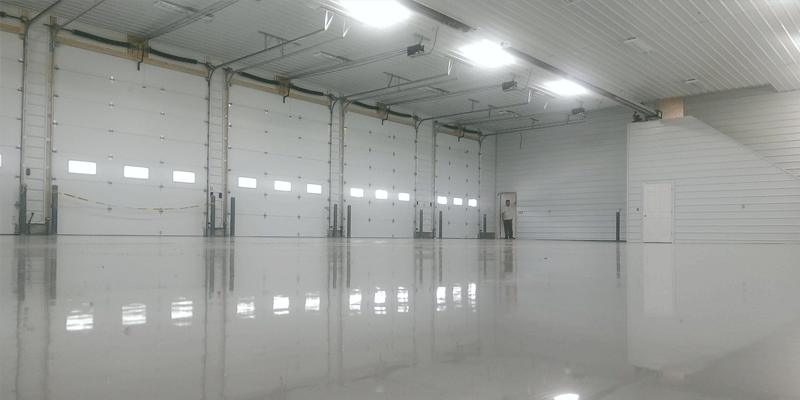Table of Contents
Pros and Cons of an Epoxy Coating

Do you need a flooring material that is both durable and stylish? Epoxy flooring may be a great option for you. This type of flooring is made by combining an epoxy resin with a hardener, which creates a strong and long-lasting surface.
However, many home and business owners are completely unaware of the potential drawbacks of an epoxy floor. Before making a final decision, be sure to consider the pros and cons of an epoxy coating.
This article will cover the fundamentals of epoxy flooring before delving into its advantages and disadvantages.
What is Epoxy Flooring?
Epoxy flooring is made from a mixture of epoxy resin and hardener. This combination creates a strong and durable surface that can resist scratches, scuffs, and other types of wear and tear.
Epoxy flooring is often used in commercial settings because it can withstand heavy foot traffic and the weight of equipment or furniture. However, this type of flooring is also becoming increasingly popular in residential settings.
Homeowners are attracted to epoxy flooring because it comes in a wide range of colors and styles. You can also create patterns or designs with epoxy flooring by using different colors or adding inclusions such as glitter or beads.
Types of Epoxy Floor Coatings
There are three main types of epoxy flooring:
1. Solid Epoxy Floor Coating
2. Metallic Epoxy Floor Coating
3. Reflective Epoxy Floor Coating
Solid Epoxy Floor Coating
Solid epoxy floor coatings are the most common type of epoxy flooring. This type of flooring is created by mixing together a solid epoxy resin and hardener. Once the mixture is applied to the floor, it will create a smooth and durable surface.
These types of epoxy floor coatings are typically used in commercial settings because they can withstand high levels of foot traffic and the weight of heavy equipment. However, solid epoxy floor coatings are also becoming increasingly popular in residential settings.
Metallic Epoxy Floor Coating
Metallic epoxy floor coatings are created by mixing together a metallic epoxy resin and hardener. This type of flooring is often used to create decorative designs or patterns.
Metallic epoxy floor coatings are usually used in commercial settings because they can withstand high levels of foot traffic and the weight of heavy equipment. However, metallic epoxy floor coatings are also becoming increasingly popular in residential settings.
Reflective Epoxy Floor Coating
Reflective epoxy floor coatings are created by mixing together a reflective epoxy resin and hardener. This type of flooring is ideal for homes with high levels of natural light because it can help reflect light to maximize the brightness of the room.
However, due to the reflective nature of this material, it may not be suitable for rooms that experience heavy foot traffic or equipment weight. Reflective epoxy floor coatings are typically used in residential settings but may also be used in commercial settings as well.
Advantages of Epoxy Flooring
1. Durability
Epoxy flooring is extremely durable and can withstand high levels of moisture, foot traffic, and other forms of wear and tear. This makes it a great choice for areas that are prone to spills and messes, such as kitchens and bathrooms.
2. Appearance
Epoxy flooring comes in a wide range of colors and styles, which allows you to easily create unique designs or patterns for your space. Additionally, epoxy floor coatings provide a smooth and attractive look that will add a touch of style to any room.
3. Easy Maintenance
Once an epoxy coating has been applied, it is very easy to maintain. You can simply sweep or mop the floor on a regular basis to ensure that dust, dirt, and debris do not accumulate over time. This makes it much easier to keep your floors looking clean and polished no matter what type of activity takes place in your home or business.
4. Cost-Effective
Epoxy flooring is a cost-effective option for many homeowners and businesses. The initial investment for an epoxy coating may be higher than other types of flooring, but the long-term durability and easy maintenance of epoxy flooring make it a wise choice for those who want to save money in the long run.
5. Environmentally Friendly
Epoxy floor coatings are made from a variety of sustainable materials, which makes them an environmentally friendly option for those who are looking to green their home or business. Additionally, epoxy flooring does not require the use of harsh chemicals or cleaners, which can further reduce its impact on the environment.
Disadvantages of Epoxy Flooring
1. Slippery
One common complaint about epoxy flooring is that it can be quite slippery, especially when wet or icy conditions are present. For this reason, some homeowners may be reluctant to use epoxy flooring in high-traffic areas like mudrooms and entryways.
2. Messy
Epoxy coatings are known for being messy during the application process. Applying an epoxy coating typically involves troweling on the mixture with a trowel and then smoothing out any bumps or irregularities with a roller or brush. This can make the job more time-consuming than applying other types of flooring materials.
Now that you know the pros and cons of epoxy flooring, you can decide if it is the right choice for your home or business. If you are looking to improve your floors’ appearance, durability, and ease of maintenance, then epoxy flooring may be a great option for you. Just make sure that you carefully consider all of the potential benefits and drawbacks before making a final decision.
